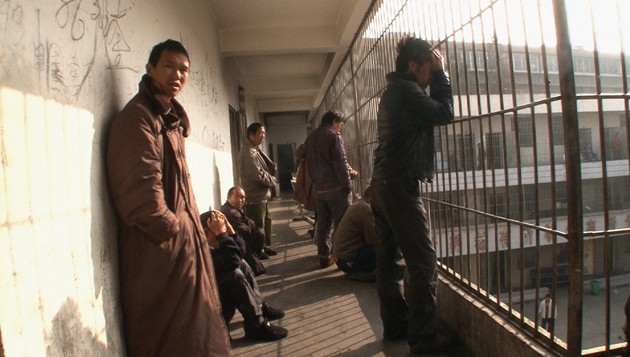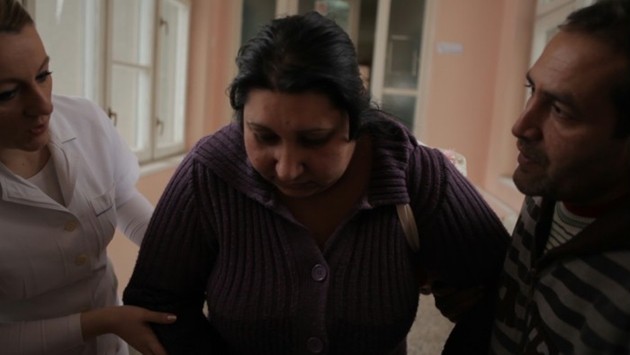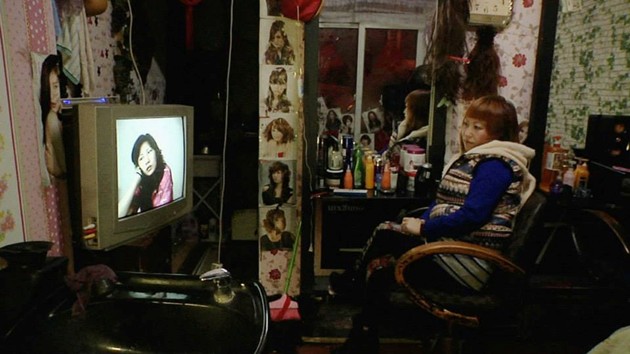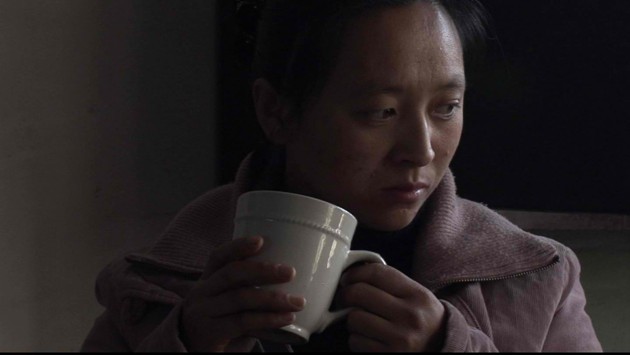
'TIL MADNESS DO US PART (Wang Bing)
Chinese documentarian Wang Bing has proven to be one of our greatest filmmakers, a master of patient and penetrating observation who uses the lengthy duration of his films to absorb the viewer in his unique process which sculpts time into fascinating patterns. In such films as his 2003 nine-hour masterwork West of the Tracks, and more recent work such as Three Sisters (2012), Wang immerses us in the worlds of memorable characters who often live in very harsh and forbidding circumstances.
These qualities come to the fore in his latest work ‘Til Madness Do Us Part, a nearly four-hour depiction of daily life within the walls of a mental institution in Yunnan Province. Shot over a few months and edited down from nearly 300 hours of footage, Wang offers a raw, unadorned, deeply empathetic portrait of men that represent Chinese society’s castoffs, abandoned, and ostracized. His film serves as a quiet, yet powerful indictment of the failure to truly care for the neediest and most vulnerable.
Although the institution depicted here is nominally for the mentally ill, many different people are housed here; murderers and the truly mentally ill are housed side by side with those imprisoned for drug offenses, people with developmental disabilities, as well as those who have caused trouble to their families, or who have angered government officials. This creates a rudimentary sort of democracy, where the harsh, unsanitary conditions – the men regularly urinate in their rooms and in the hallways – and the sheer monotony of existence devolve into trapped despair. Except for a brief sequence where one of the inmates is granted temporary leave, the camera never leaves the men’s quarters, powerfully conveying to the viewer the feel of being confined in these close spaces. However, despite these seemingly hellish circumstances, Wang’s camera also finds beauty, humor, and tenderness: some men huddle in bed with each other for comfort; one man flirts with a woman housed on the women’s floor below. ‘Til Madness Do Us Part demands patience from its viewers, but amply rewards it with an indelibly memorable experience.
(February 19, 6:30pm)

A DREAM OF IRON (Kelvin Kyung Kun Park)
Fresh from its recent premiere at this year’s Berlin International Film Festival - where it won the NETPAC prize for best Asian film - comes this complex, densely layered, hauntingly poetic, and beautifully photographed film. A sequel of sorts to his 2010 debut Cheonggyecheon Medley, Park’s second feature is structured around a voiceover addressed to a woman who left the narrator to pursue shamanic spiritualism. This spurs him to search for his own god via rumination on three different eras: the ancient world, represented by the cave etchings of whales in Ulsan, South Korea; the legacy of South Korea’s rapid modernization in the 1960’s and 1970’s, as well as the labor and worker’s rights struggles this engendered; and the shipbuilding and metal industries of the present day. The messages to the narrator’s lost love are interspersed with wordless, meditative passages depicting Buddhist ritual prayer, underwater photography of giant whales, and looming, massive structures of shipyards and other metal structures, set to a soundtrack of Buddhist chanting and Mahler compositions. Park ambitiously attempts to meld religious and spiritual rituals with the modern technological age, finding some fascinating connections and juxtapositions linking them together. The effect of all this is deeply elegiac, the mourning of lost love metaphorically associated with the fate of the metal-based industries that have been increasingly marginalized in favor of our current digital and internet-based technology.
(February 15, 5pm; February 16, 2pm)

AN EPISODE IN THE LIFE OF AN IRON PICKER (Danis Tanovic)
Tanovic’s latest film, Bosnia-Herzegovina’s entry for this year’s Foreign Language Oscar nominations, is not actually a documentary, but a carefully crafted reconstruction of actual events enacted by the people involved. The film follows Nazif and Senada, a Roma couple with two young daughters living in an impoverished rural village. Nazif is the titular “iron picker,” earning an unstable, hardscrabble living by foraging for metal and chopping up junked cars to earn money from the metal he manages to obtain. Despite their poverty, they seem to be a relatively happy and loving family. However, the precariousness of their existence is painfully revealed when the pregnant Senada suffers a miscarriage and is taken to the hospital. There the doctors relieve her immediate bleeding, but refuse to operate on her unless she can produce an insurance card or pay an amount that is far more than they can afford. Thereafter follows a desperate, nightmarish quest where Nazif’s efforts to find care for her, involving visits to multiple hospitals and seeking help from social services and Roma organizations, come to no avail. Only by what is essentially an act of insurance fraud is Senada’s life able to be saved.
Tanovic effectively uses the techniques he gained in his previous life before making feature films as a wartime documentarian to lend a stark, neo-realist atmosphere to this understated drama. Using the actual people who went through this experience as his actors lends an authenticity that can’t be faked, giving strength to Tanovic’s protest against the ongoing discrimination against, and marginalization of, the Roma community in his native country that too often leads to the kind of life-threatening situation he powerfully depicts here.
(February 17, 8pm; February 18, 4pm)

THE PRIVATE LIFE OF FENFEN (Leslie Tai)
This fascinating 29-minute short uses the raw materials of the personal video diaries of Fenfen, a young woman and migrant worker from southern China, for a documentary experiment that interrogates the intersections and the porous boundaries between private life and public space. Scenes from Fenfen’s video diaries, culled from over 100 hours of footage shot over four years, play on TV screens in various public places – hair salons, restaurants, fruit stands – as a hybrid of reality TV and art installation. We watch Fenfen as she reveals many aspects of her difficult life, including forced marriage, domestic violence, and a suicide attempt, as well as watch other people watching her. They judge and give commentary on Fenfen’s exposure of private matters. “What is she trying to say to society?” one viewer asks. “She can’t let go of that boy,” another observes, as if viewing a soap opera. Tai raises thorny questions concerning exploitation of documentary subjects, our own voyeuristic impulses, as well as the lack of privacy and free expression endemic in Chinese society itself.
(February 24, 8pm; February 27, 7pm; screens with Mothers)

MOTHERS (Xu Huijing)
The victims and enforcers of China’s often draconian one-child family planning policy are depicted with equal sympathy and penetrating insight in this compelling film, which focuses on the impact of this policy on Ma Village in Shanxi Province. This documentary clearly starts from a personal place, as the filmmaker opens by informing us that he was his mother’s second child, and as such should not have been born according to policy. Set around the time of Mao Zedong’s birthday celebration (celebrated in the village almost as a deity), Mothers examines with riveting detail the efforts of local enforcers of the policy to carry out stringent quotas by forcing women who have exceeded the number of allowed children to be sterilized or submit to IUD-based birth control. The penalties for mothers who don’t follow regulations range from having fines levied against them to being denied fill citizens’ rights in the village, including having children taken out of school. The latter sections of the film become almost a thriller, as officials attempt to track down one particularly elusive and recalcitrant woman. Xu gains remarkable candor from his subjects, especially the enforcers, who are quite revealing about their methods. The film ends with a glimmer of hope in an end note about the Chinese government’s recent stated intention to relax the one child-policy. However, this change unfortunately comes too late for the many women who have suffered in Ma Village, as well as many other places in China.
(February 24, 8pm; February 27, 7pm; screens with The Private Life of Fenfen)






















